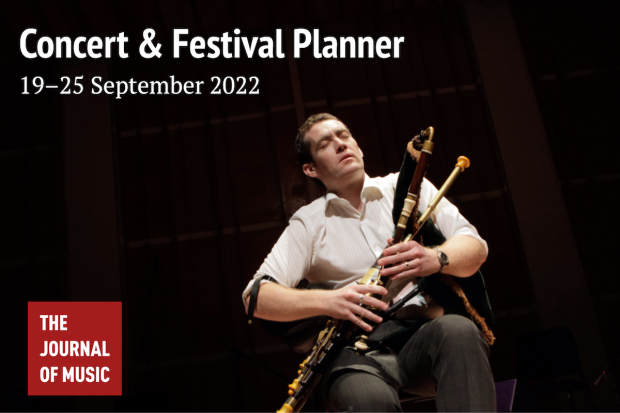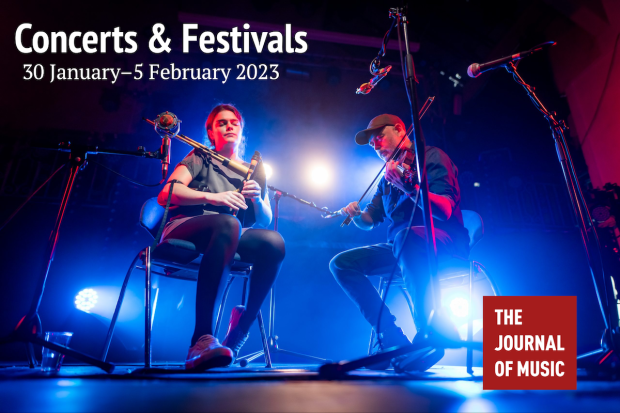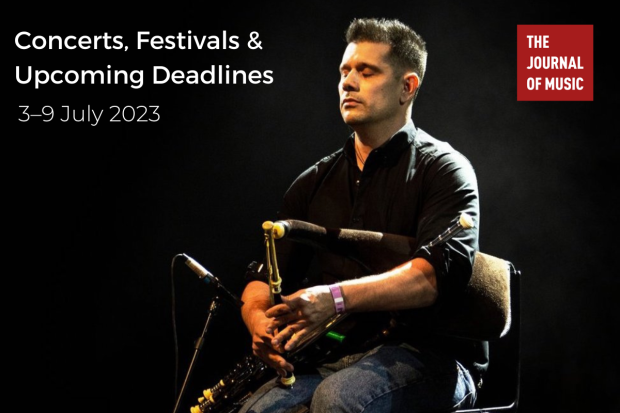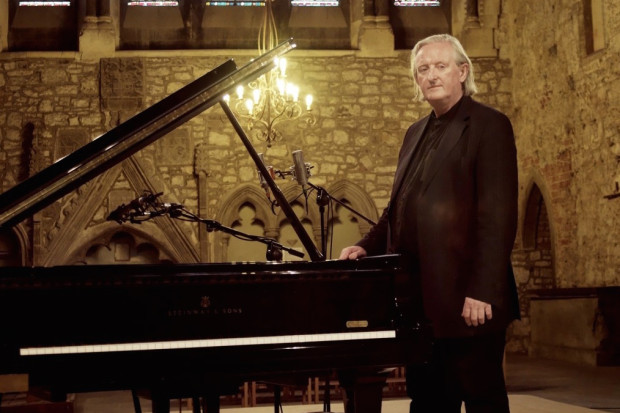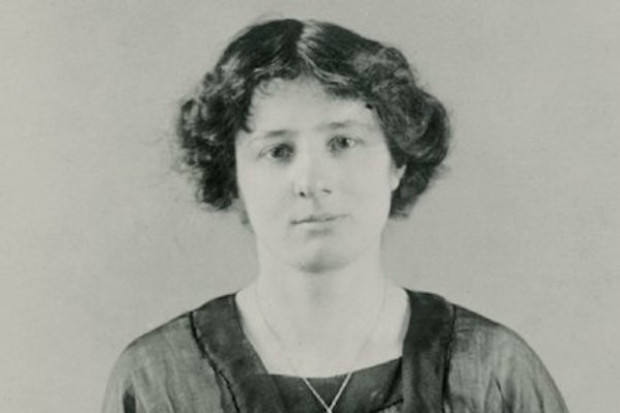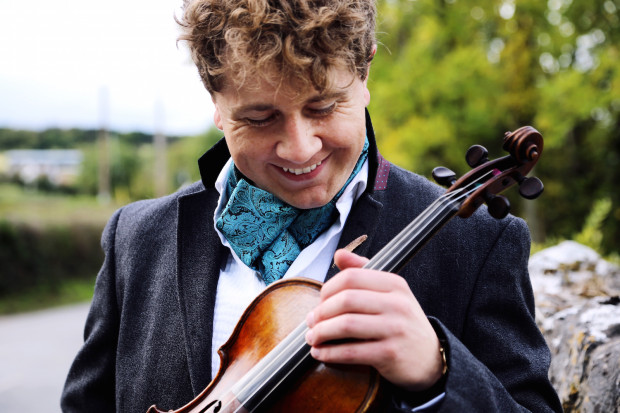
An Orchestra Out of Step?
What counts as contemporary music? In the conservative world of classical music, ‘contemporary’ is often interpreted quite loosely. Concert programmers sometimes think they are doing their bit for new music if they programme works that were composed inside the last thirty or forty years. Of course, this wouldn’t make sense in any other art form. In the art world for instance, an exhibition of paintings from the 1980s would be deemed a retrospective; a thirty-year-old film being reshown in a cinema would almost now be considered a ‘classic’. In my view, the term ‘contemporary music’ refers to music that was composed relatively recently, perhaps inside of the last ten years or so.
In a previous article in this journal, I expressed some concern that state-funded entities like RTÉ and the National Concert Hall were not doing enough to imaginatively promote a diverse repertoire of classical music. But I have also suspected, for some time, that over the past decade or so the amount of contemporary music being performed during the RTÉ National Symphony Orchestra’s season was actually dwindling by the year.
If the current orchestral repertoire being performed doesn’t contain a healthy selection of works from the present, the whole endeavour risks becoming out of step with contemporary culture. After observing the scarcity of new music on this year’s programme, I undertook some research to see if my instinct was correct and whether contemporary music was indeed vanishing from the RTÉ NSO’s concerts. The findings were interesting, to say the least.
Music of the present day
First of all some clarifications: for the purposes of this article I only considered works composed within ten years of the season in question. While any definition of what constitutes contemporary music will have a certain degree of arbitrariness to it, a ten-year time frame has the dual advantages of covering music that is truly of the present day – premieres and works composed very recently – as well as pieces which are premiered in a particular year and subsequently taken up by other orchestras and touring soloists in the years thereafter. Applied evenly over the years, I felt that this time frame would adequately reflect the RTÉ NSO’s commitment to contemporary music over the long-term.
The next question was which concerts to include. As with most orchestras with a public remit, the RTÉ NSO will participate in an eclectic range of concerts in any given year. There are concerts of film music, computer game music, music featuring on the Leaving Certificate syllabus, kids’ workshops, lunchtime concerts, and so on. In addition, there are also partnerships with other organisations such as the Contemporary Music Centre or Wide Open Opera as well as events such as last year’s Composing the Island festival. Even though some of these initiatives – such as the New Music Dublin weekend – make contemporary music their explicit focus, for the purposes of this survey, I only looked at those concerts which formed part of the RTÉ NSO’s ‘main season’ or ‘subscription’ series.
This requires an explanation. Regarding festivals, I deemed it only fair to exclude events like the Living Music Festival and New Music Dublin as these initiatives are very much dependent on the availability of funding, both internally and externally, and involve other parties. Back in the boom times, RTÉ had the resources to host an expensive event like the Living Music Festival. When the recession hit, the festival was cancelled and Dublin was without a contemporary music festival until the advent of New Music Dublin in 2013. Thus, including the Living Music Festival concerts would have skewed the figures, resulting in a huge tally of contemporary music for the earlier years as opposed to those which contained no contemporary music festival at all. I excluded the New Music Dublin festivals for the same reasons. Similarly the Composing the Island festival last year was a once-off event that was part of the 1916 Rising Centenary celebrations.
The Horizon’s lunchtime concerts of contemporary music presented another dilemma. These concerts – which in recent years have been rebranded as ‘Music of Our Time’ – constitute a rather weak gesture by RTÉ. They are scheduled for the worst possible time, Tuesday lunchtimes, when few people are available to attend, and the orchestra can also be under-rehearsed. The last Horizons concert I was able to make, back in 2012 (unfortunately, like most people, I have to work on Tuesday afternoons), included a performance of Kevin Volans’s Concerto for Piano and Wind Instruments that nearly collapsed in the opening moments. Before the 2011/12 season, these concerts were considered so irrelevant that they didn’t even make it into the season brochure. As these concerts are a prime example of the ghettoisation of new music, I excluded them from the survey, a decision that ironically works in RTÉ’s favour as the number of these concerts per season has declined in recent years and there is no mention of them in the current season brochure.
The main season
The litmus test of any orchestra’s commitment to contemporary music is what is contained within its annual subscription or ‘main season’ series of concerts. A single weekend contemporary music festival plus a small number of lunchtime concerts do not sufficiently impact upon the listening public to the degree that a regular weekly concert series does over nine months. Furthermore, the ‘main season’ gives the most accurate indication of an orchestra’s identity and the kind of musical taste that it tries to cultivate or satiate in its core audience. The RTÉ NSO is no different in this regard. These main season concerts usually take place on Friday nights at the NCH and consistently average around 30 concerts per year, providing a relatively consistent barometer to determine the amount of space devoted to contemporary works.
After getting hold of the season brochures for the past 14 years – as much as I could get my hands on – I calculated the total amount of new music (in minutes) that was performed during each season. The results – which can be viewed below – confirmed my initial impression that the amount of contemporary music was falling from an average of well over 100 minutes from 2004 to 2009 to roughly half that from 2009 onwards. So why did this happen?
Amount of contemporary music performed (in minutes) during the RTÉ NSO’s main season from 2004 to present. 
Markson to Buribayev
From 2004 to 2009 the principal conductor of the RTÉ NSO was Gerhard Markson who, while hardly an outspoken advocate of new music, was nevertheless committed to the idea of a broad selection of music from all eras appearing on the RTÉ NSO’s season programme. Indeed it’s a testament to Markson’s flexible technique that he was capable of conducting everything from Handel to the most outré kind of modernist and contemporary repertoire. Throughout his tenure the amount of contemporary music consistently averaged above 100 minutes, peaking at the apex of his tenure in the 2004/5 season, which included a concert performance of Gerald Barry’s opera The Bitter Tears of Petra von Kant.
When Markson’s tenure as principal conductor ended in 2009, immediately the amount of contemporary music began to fall. It is tempting to attribute this decline to the economic crash of 2008/9 when audience levels would have dropped and a low-risk programming strategy adopted to maintain ticket sales. But if this was the sole reason, one would have expected the amount of contemporary music to gradually rise again as the recovery took hold. The evidence shows no such rise; in fact, the opposite is the case and the downward spiral accelerates. It is for this reason that the decline in contemporary music seems to have had less to do with Ireland’s economic woes and more to do with management reshuffles and the appointment of Markson’s successor: the Kazakh conductor Alan Buribayev.
In contrast to his predecessor, Buribayev’s commitment to contemporary music resembled the Kazakh government’s policy approach to the Aral Sea: just ignore it and hopefully the problem will go away. And go way it most certainly did. During the 2013/14 season contemporary music dried up almost completely to a measly 10 minutes – a wholesale abandonment of the notion of providing the public with a broad spectrum of music. Buribayev’s tastes were much more narrowly focussed than his predecessor and his appearances on the podium with the RTÉ NSO almost exclusively coincided with performances of either Romantic or Russian repertoire. During his tenure the few recently composed works that made it on to the programme were usually assigned to the assistant principal Hannu Lintu who departed in 2013 to take up the role of chief conductor of the Finnish Radio Symphony Orchestra where new music is currently flourishing.
Management reshuffles
Of course, it’s not fair to place responsibility solely on the principal conductor. While the resident conductors will have the greatest say in the programming of the concerts that they conduct themselves, a large proportion of the season is performed by guest conductors. This is where the programming of the total season becomes a collaborative affair involving the orchestra’s management who coordinate the entire project, navigating logistical hurdles like the international schedules of touring soloists and conductors. But since the departure of Brian O’Rourke – who retired as general manager in 2009 around the same time as Markson – as well as administrators who were willing to take big musical risks such as Niall Doyle (RTÉ Director of Music, 1998–2006), management have displayed less interest in making contemporary musical developments part and parcel of the RTÉ NSO’s season. By contrast, it was a measure of Doyle’s faith in contemporary composers that he allowed a maverick like Raymond Deane to have a free hand and invite the modernist composer Luciano Berio to be the featured composer of the inaugural RTÉ Living Music Festival back in 2002. Berio has not been seen since on an RTÉ NSO programme.
The truly shocking thing about all of this, however, is not so much the fact that contemporary music is on the decline but rather how poorly the total output compares to the orchestra’s peers in neighbouring countries, i.e. state-funded radio orchestras that have a public-service remit. Applying the same criteria, I totalled the amount of recently composed music and conservatively estimated the length of upcoming world premieres scheduled to appear on the 2017/18 seasons of the primary broadcasting orchestras in the UK, France, the Netherlands, Denmark, Sweden and Finland. As with the RTÉ NSO survey, these totals only include ‘main season’ concerts and exclude contemporary works performed during events such as the BBC Proms or new music festivals such as Helsinki’s Musica Nova festival or the Festival Présences in Paris. The results (which can be viewed below) appear to reveal a staggering disconnect between the RTÉ NSO and its peers.
Comparison between the RTÉ NSO and other broadcasting orchestras in terms of contemporary music performed – 2017/18 season.
International comparison
This season there are just two works on the RTÉ NSO’s main season that were composed in the last 10 years: an organ concerto by Gerald Barry and an expanded version of Deirdre Gribbin’s piano concerto The Binding of the Years that was originally premiered in 2012. (The concert celebration of Mícheál Ó Súilleabháin’s work on 8 September did include some newly composed work, but it was not included in the main season, being referred to as a ‘Prelude’; for the purposes of comparison I have had to focus on the main season concerts only.)
Both the Barry and the Gribbin are expected to last 30 minutes each, bringing the total amount of new music in the main season to around one hour. By comparison the Orchestre Philharmonique de Radio France more than doubles this figure while over in Helsinki, former assistant principal of the RTÉ NSO Hannu Lintu and his colleagues are busy packing in more than three times that amount with the Finnish Radio Symphony Orchestra in a season that will include seven world premieres. The Danish Radio Orchestra manages a similar amount while the BBC Symphony Orchestra and the Radio Filharmonisch Orkest go much further and incorporate a selection of recent works totalling around 238 and 282 minutes in their respective seasons. Leading the pack however is the Swedish Radio Symphony Orchestra who are quite literally gorging themselves on contemporary music with a season that manages to fit in around 317 minutes. That’s over five times the amount that the RTÉ NSO can muster over a comparable number of concerts!
None of this is the fault of the dedicated musicians of the NSO who can consider themselves among the most underappreciated artists in the country, but serious questions need to be asked of RTÉ who have allowed this impoverished situation to develop. In these fraught times, promoting classical music is a little bit like tackling climate change: the short-term temptation to do nothing has serious consequences further down the line if nothing is done. Over-relying on the familiar Romantic repertoire in the hope that it will placate the well-heeled but increasingly ageing crowd that make up the majority of the audience on Friday nights is a recipe for disaster while wheeling out the old canard about audiences being risk-averse does not acknowledge the miracles that can be achieved with imaginative programming, not to mention adequate promotion.
The notion that contemporary music drives away audiences is certainly not substantiated by the programmes of peer orchestras in the UK and on the continent. If anything, the opposite is likely to be the case as new music is more likely to draw in a younger, more diverse audience, as some of the Living Music Festivals showed. If RTÉ needed any encouragement to revise their policy towards contemporary music they should study the impressive statistics on the webpage of the Finland Radio Symphony Orchestra on the occasion of their 90th anniversary:
The FRSO is now an orchestra much in demand; 95% of the tickets for FRSO concerts at the Helsinki Music Centre were sold and more than 1.4 million viewers tuned in online and via TV. Each radio broadcast attracted about 100,000 listeners. According to Finnish Radio CEO Lauri Kivinen, the FRSO is a source of great pride for the company.
Finland is a country of comparable population to Ireland and Helsinki is roughly the same size as Dublin, and although conventional wisdom has it that the Finns are much better than us at virtually everything, it is nevertheless concerning that this chasm has been allowed to develop unchecked. Next year the NSO will celebrate its 70th anniversary but without some serious looking in the mirror on the part of RTÉ, I doubt we’ll be able to say anything remotely as impressive.
Published on 16 October 2017
Adrian Smith is Lecturer in Musicology at TU Dublin Conservatoire.












